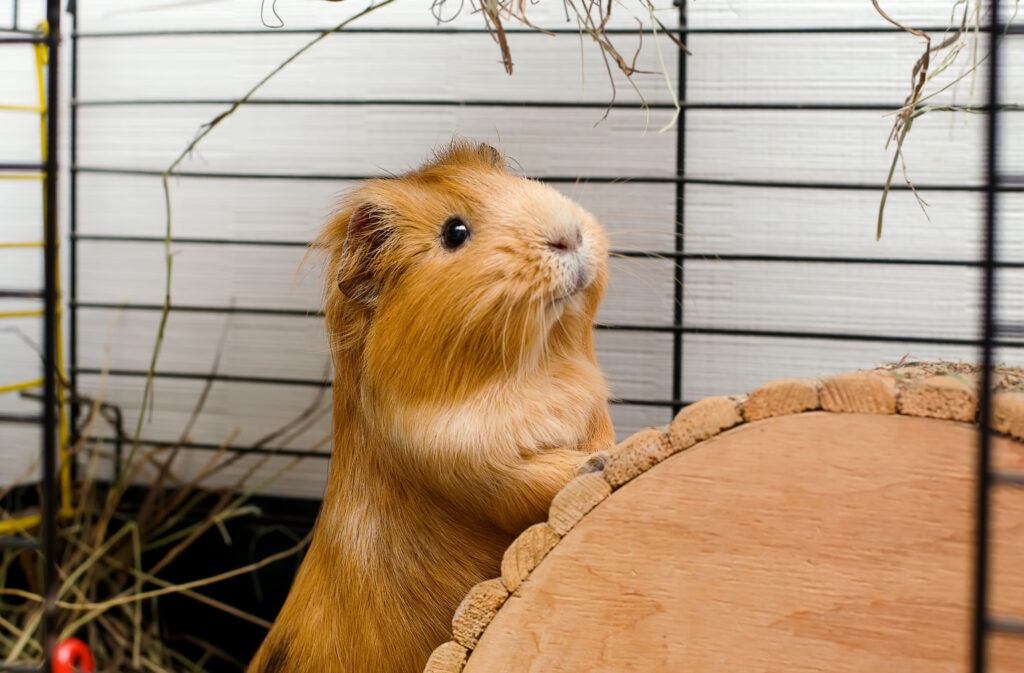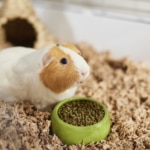Is Spaying Guinea Pigs Safe? When to Do It and Why

Photo by devmarya/Adobe Stock
To spay or not to spay: It’s a legit question to ask yourself if you’ve just adopted a guinea pig.
First off, you should always keep same-sex pairs together—so keep your girl piggies separated from any boys (and be 100% sure about it). This is the best way to prevent a piggie pregnancy, and it also means you can avoid the risk that comes with spay surgery for a tiny pet.
If you and your vet do decide to spay your female guinea pig, the idea age is usually 4–8 months old, but there are several things to take into consideration before making this very delicate decision.
Key Takeaways
- Tiny animals are more vulnerable to anesthesia, and risks increase with age, illness (like respiratory infections), or conditions such as GI stasis and pododermatitis.
- Two spay options exist. Ovariohysterectomy prevents both pregnancy and uterine disease but is more invasive, while ovariectomy is less invasive but doesn’t eliminate uterine disease risk.
- Abdominal incisions can be exposed to bedding and poop, raising infection risk; surgery also stresses a guinea pig’s delicate GI tract.
- Ultimately, you should discuss pros and cons with a vet specializing in exotic animals who has extensive experience with spay surgeries.
What Are the Risks of Spaying Your Guinea Pig?
Any surgery can carry a risk for pets, including guinea pigs. Although there isn’t a universal answer as to whether it’s dangerous to spay your pig, it can be riskier for smaller creatures.
And those risks increase with age, dental issues, gastrointestinal stasis, pododermatitis, and other diseases, says Susan Tyson, VMD, a veterinarian and the owner at Avian & Exotic Philly Vet Medical Surgical Clinic in Philadelphia.
It’s a controversial topic, and not every veterinarian will think it’s right for every pig. The Merck Manual, for instance, suggests housing same-sex pairs together to avoid pregnancies—but chat with your own vet to discuss your individual pig.
Some risk factors include:
- A guinea pig’s age. The older a guinea pig is, the riskier the anesthetic procedure, as they may be more prone to complications.
- A guinea pig’s health. An upper respiratory tract infection or pneumonia can make anesthesia more of a risk, says Walter Merker, DVM, an exotic animal veterinarian at Orange Grove Animal Hospital in Tucson, Arizona. Before a spay, you should resolve any signs of infections—like nasal discharge, sneeze, coughing, or wheezing—and check that there are no underlying diseases.
- Anesthesia: Guinea pigs are one of the “most challenging rodents to safely and effectively anesthetize” due to their small body size, according to an anesthesia summary published by Johns Hopkins University.
- Sensitivity to stress: As prey animals, guinea pigs can become more stressed than usual in new environments, particularly those with loud noises. Stress can slow down their digestive system and can even slow down recovery post-surgery.
There are two main types of spay procedures for female guinea pigs:
- Ovariohysterectomy (OVH): The more traditional method known as “spay,” OVH removes the ovaries and uterus, eliminating the possibility of pregnancy and the risk of uterine diseases or cancer. It’s less preferred since it’s more likely to lead to trauma: Guinea pig bellies often rub along the ground, and the one incision site is on their lower abdomen.
- Ovariectomy (OVE): OVE removes only the ovaries and reduces surgical time and trauma, Dr. Tyson says. However, the risk of uterine disease remains. Vets usually prefer this method, as it’s less invasive, is less likely to be painful, and generally has a faster recovery time.
Dr. Tyson sees more post-op complications with OVH than OVE, but that doesn’t mean there’s zero risk with OVE. Given a guinea pig’s anatomy, abdominal incisions can linger on poop and bedding—and given how much they poop, you’d need to be extra vigilant about the cleanliness of their cage.
These factors can all lead to post surgical complications such as infection, pain, inflammation, and, in rare cases, excessive scar tissue, known as fibrosis. The stress on the nearby GI tract can come into play as well. Anesthesia, pain, and general handling of the belly during surgery can slow down digestion, which may lead to gastrointestinal stasis.
If you need to spay your pig—for instance, if they have a life-threatening cyst—make sure they’re a good candidate with a pre-surgical exam, pre-anesthetic blood work, and an exotic veterinarian who’s highly experienced with this type of surgery.
X-rays are also recommended to rule out cancer, cardiac enlargement, masses, and musculoskeletal disease, particularly with older pigs, Dr. Tyson says.
Are There Benefits to Spaying Your Guinea Pig?
There are some cases where a vet may recommend spaying your guinea pig to treat a health issue or to prevent one.
This might include:
- Removing ovarian cysts. Older female guinea pigs are more susceptible to ovarian cysts, which can cause hair loss, painful crusting of the teats, and abdominal pain.
- Reducing the risk for ovarian disease and cancerous mammary masses. Spaying your guinea pig within the first year reduces the risk of mammary neoplasia, mammary cancer, and reproductive diseases like uterine cancer.
While avoiding overpopulation is also a benefit, the Merck Manual recommends permanently separating males and females as the “safest, easiest, and least expensive way” to avoid breeding.
Ultimately, it’s wise to have a conversation with your veterinarian to see what’s right for your guinea pig.
FAQs About Spaying Guinea Pigs
Do I need to spay my guinea pig?
No, you don’t necessarily need to spay your guinea pig, but it’s also important that you don’t breed your guinea pig or contribute to the overpopulation problem.
How much does spaying a guinea pig cost?
The cost of spaying a guinea pig will vary depending on the guinea pig’s age, where you live, and whether it’s an ovariectomy or ovariohysterectomy, Dr. Tyson says. Typically, ovariectomy procedures cost anywhere from $600 to $1,200, while ovariohysterectomy procedures are $1,500 to $2,600.
Should you neuter a male guinea pig?
It depends. The Merck Manual suggests that neutering a male is safer than spaying a female. It can also help prevent testicular disease, but there’s little research on long-term health effects. Chat with an experienced exotics veterinarian about the best choice for your pig.



